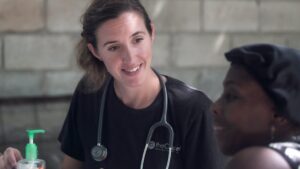When patients are black women, major fibroid treatment gaps often mean delayed diagnosis, worse symptoms and too many hysterectomies. Now, that’s a big problem. Because black women have a higher fibroid risk. In fact, by the time they’re in their 40s, almost 80% of black women will develop these non-cancerous tumors. And, as a result, they often experience pain, heavy bleeding, anemia and other debilitating symptoms.

Recently, a National Institutes of Health study uncovered a genetic finding that could explain why Black women are disproportionately affected by fibroids. And it all has to do with factors that turn genes 'on' or 'off' in the muscular uterine tissue, also described as gene expression
Basically, when genes get turned on in a cell, they proceed to make RNA and proteins. And, in this study, researchers observed higher expressions of the VWF gene in uterine muscle tissue for Black women than for women of other races. Why does that matter? Well, the VWF (von Willebrand factor) gene gives instructions to a protein that regulates blood vessel formation. If black women form more uterine blood vessels than white women, that means they also develop more vascular smooth muscle cells. And, since researchers suspect that these smooth cells give rise to fibroid formations, it could explain why women of color have higher fibroid occurrence rates.
Adding to this genetic issue? Experts believe that greater environmental exposure to endocrine-disrupting chemicals and heavy metals, along with chronic stress due to persistent racism, and a greater tendency to use harmful hair products further increase the risk for Black women, truly stacking the deck against them.
Having an increased fibroid risk is bad enough. But all too often, black women face delayed fibroid diagnoses. In fact, research from Johns Hopkins Medicine reveals that up to 50% of fibroids cases go undiagnosed, often because doctors don't bother taking women's complete menstrual histories.
Even worse? If women of color do receive an accurate diagnosis, they often receive less comprehensive medical information. That means they’re less likely to learn about non-invasive fibroid treatment options. And more likely to undergo avoidable hysterectomies.
Already, efforts like the fibroid bill are trying to close these fibroid treatment gaps. And now, the state of New Jersey is joining the cause. That’s why, today, we’re highlighting the Garden state’s efforts to improve black women’s health outcomes, especially when it comes to fibroid treatments.
Linda Goler Blount, president and CEO of the Black Women’s Health Imperative, recently explained to Spotlight News that closing fibroid treatment gaps means first addressing years of inequity. She said, “Women don’t want to talk about it. Men obviously don’t want to talk about it. This makes it a challenge. And as Black women, we are socialized to suffer in silence.”
To address that challenge, women need to speak up about their fibroid experiences, she said. “Women—Black women in particular—need to pay attention to our bodies. We need to know this isn’t normal. You shouldn’t be suffering month in and month out. Suffering is not normal, and it is not necessary.”
We couldn’t agree more. That’s why we highlight fibroid warriors in our Woman Crush Wednesday series. And it’s why we celebrate legislative efforts that help women understand their treatment options.
NJ Senator Cory Booker sponsored the Stephanie Tubbs Jones Uterine Fibroid Research and Education Act. It allocates $30 million a year, for the next four years, to fund fibroid research, increase federal efforts to collect treatment outcome data, and to publicly share treatment options.
The bill is much-needed in New Jersey especially, where black women face many health disparities. In that state, Black women are seven times more likely than white women to die during or shortly after childbirth. In trying to improve maternal health outcomes, doctors and legislators are also trying to close fibroid treatment gaps. And that’s an effort we applaud as Houston area fibroid specialists.
There are several different ways to treat fibroids, and they range from natural to minimally invasive, followed by surgical options. Not every treatment makes sense for every woman. But each fibroid sufferer—regardless of race—deserves to learn about every option. That way, she can make an informed decision. And hopefully, she’ll realize that most women with fibroids don’t need a hysterectomy to find relief.
Sadly, fibroid treatment gaps widen because of racial disparities in healthcare. Dr. Ndeye-Aicha Gueye, member of the New Jersey Black Women’s Physicians Association, explains the problem. “Sometimes [women are] just so desperate to have their symptoms lessened,” they sign up for surgery without exploring other possibilities. Even worse, she says? “Black women are also less likely to be offered other options.”
Plus, we know less about how fibroids affect Black women, because of limited research on their specific symptoms and outcomes. So, to counteract this inequity, we need more research focused on women of color. And we all need to speak up about minimally invasive fibroid treatment options like UFE (uterine fibroid embolization.)
Want to learn more about this alternative to hysterectomy? We invite you to click here to request an appointment and schedule a consultation with our team of fibroid specialists. Don’t live in the area? No problem. We also offer virtual consultations, to help you understand all your treatment options. And to join efforts to close fibroid treatment gaps, all across the country.

Scheduling
Please contact our dedicated specialists to schedule a consultation today.
2024 Houston Fibroids. All rights reserved. Website Design by Healthcare Success